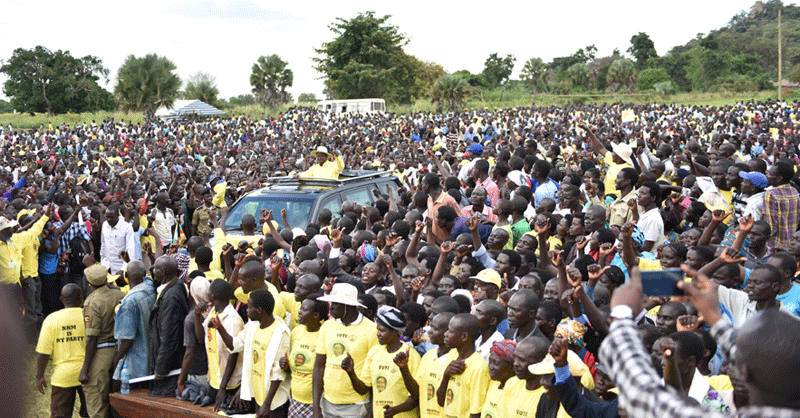Columnists
Economics of opinion polls
Is Museveni enjoying the advantage of being the only tested “lemon”?
This week, results of two opinion polls were published. The first one was by the New Vision newspaper which indicated that 71% of the sampled voters wanted Museveni to continue leading the country after 30 years in power. Only 19% would vote for Kizza Besigye while Amama Mbabazi got only 6%.
A day later, another poll by Research World International (RWI) indicated that 51% of the registered voters they sampled would vote for Museveni, compared with 32% and 12% for Besigye and Mbabazi respectively. The other five candidates in the presidential race seemed inconsequential in both polls.
Although there were huge divergences in the percentages that both pollsters found, the key observation is that in both polls Museveni was in the lead. I have seen several opinions in media (both mainstream and social media), where the supporters of the two sides — the anti-Museveni and pro-Museveni — were more interested in showing how the poll by, the New Vision and RWI were bogus.
My own view is that whichever way you look at it, the incumbency factor is giving Museveni the advantage.
Democracy in these poor, illiterate, ill-informed countries such as Uganda is extremely imperfect. In economics we have a concept, “information asymmetry”, which analyses the cost of acquiring information about what someone is about to buy.
Economists have since the 1970s used the market for used cars to explain how information asymmetry manifests itself into a real life problem. It arises when the parties to a transaction do not have the same degree of information necessary to make an informed decision.
In 1970s, George Akerlof used the term “lemons” to express defective used cars in the marketplace. Unlike the market for brand new cars, the buyer for a used car generally cannot ascertain the value of the vehicle accurately, and may therefore only be willing to pay an average price for it, somewhere between a bargain price and a premium price.
Market for used cars!
The best way of finding out whether a car is a lemon is to drive it for a year or two. The seller of a used car has done so; potential buyers have not. While they can, at some cost, have the car examined by a mechanic, that may or may not be sufficient.
Suppose, there are only two kinds of cars: good cars and lemons. Half of the sellers have good cars; half have lemons. Sellers know what kind of car they have; buyers do not. Buyers prefer good cars to lemons. Sellers value lemons at Shs.8 million and the good car at Shs.16 million.
Buyers value lemons at Shs.9 million and the good car at Shs.20 million. It appears that lemons should sell at between Shs.8m and Shs.9m, good cars at between Shs.16m and Shs.20m.
There is a problem. Buyers cannot, at a reasonable cost, tell whether a car is a lemon. The sellers know, but of course do not want to convey the information, since it is obviously in the interest of every seller to claim that his car is a good one. So each buyer is buying a gamble — some probability of getting a good car and some probability of getting a lemon.
It looks as though the probabilities are 50-50, since half the cars are lemons. If so, and if the buyers are risk-neutral (the 50-50 type), they will offer no more than the average of the values of the two kinds of cars, which is about Shs.13.25m.
At that price, owners of lemons will be glad to sell, but owners of good cars will not. Thus a car that is actually sold is certain to be a lemon, since owners of good cars will refuse the best offer buyers are willing to make. So only the lemons get sold. In more complicated situations, with a range of qualities of cars, the result may even be worse; in some cases only the single worst car gets sold.
Economists contend that one obvious solution to the above is for sellers with good cars to offer a guarantee — say a legally contracted promise to buy the car back a year later at the purchase price minus a year’s rental if the buyer finds it is a lemon.
Relate this model to the presidential race we are witnessing today and see the reason why voters in republics of our type may find it difficult to stop voting for the incumbent.
I think we agree that apart from the insignificant newcomers, the top three candidates (Museveni, Besigye, and Mbabazi) qualify to belong more to the market of used cars than that for new cars. The question that is before Ugandans is; under the circumstances (of information asymmetry), who the three candidates is likely to be a better lemon?
One of the lemons is tested while the others can only promise to be good or even better. But can they afford to give the buyer (in this case the voter) a guarantee?
Adverse Selection
The problem before voters in countries such as Uganda is known, in the context of insurance markets, as adverse selection.
The person buying the insurance has information about himself that the insurance company cannot easily obtain: how carefully he drives, what medical problems he has had in the past, whether he abuses drugs etc. If the customer knows he is a bad risk and the insurance company does not, insurance is a good deal for the customer but a bad deal for the insurance company.
The “good risk” person (one without any chronic disease or bad habits) would be happy to buy insurance at a price reflecting the low probability that he will get sick or die next year, but the insurance company will not offer it to him at that price, since the insurance company does not know he is a good risk. The result is that bad risks are more likely to buy insurance than good risks.
The equilibrium result may well be that many good risks are priced out of the market, even though there is a price at which they would be willing to buy insurance and the insurance companies would gain by selling it to them.
When I watched the debate of the candidates last week, it appeared to me that perhaps all the “good risks” have been priced out the Presidential race. Now it is market for the Mabilizis and Kyalyas of this world.
Moral Hazard
Most of the things we insure against are at least partly under our own control. That is true not only of my health and the chance of my house burning down, but even of losses from “acts of God” such as accidents, floods or wild fires. I cannot control the flood, but I can control the loss — by deciding where to live and what precautions to take. I may not avoid accident as long as I drive a car but I may take precautions to reduce the possibility of the accident.
Whether or not I am insured, I take those precautions, and only those precautions, that save me more than they cost me.
Once I have bought car insurance, part of the costs of being careless while on the road or drunk driving have been transferred to the insurance company. Haven’t you heard people who drive carelessly and they are fond of saying, “I will knock you and insurance will pay”!
So people who are insured will take less than the efficient level of precaution. This problem is known as moral hazard. It is an inefficiency resulting from an externality; once I am insured someone else bears some of the cost of my actions.
I have a feeling that the extended incumbency factor has created a moral hazard problem in our politics. That is why animals such as leopard no longer reside in game parks or spotting the black and gold skin. They found their way to State House and they have multiplied into very big crowds spotting yellow.
A friend recently asked, “Between moral hazard and adverse selection, I just cannot figure out why African economies don’t tick. Where do we fail?” To which Charles Onyango-Obbo replied, “Moral hazard — I believe so even more firmly lately.”
On my part, I suggested thus, “Ours may not be a simple information problem, but a multidimensional one, fueled by biology.
I think we Africans were created to break the rules. Even where our actions are not ‘insured'” I was cautioned not to be too harsh on Africans, reminding me that even John Magufuli (the news making new Tanzanian President) and Nelson Mandela are Africans!
Comments














